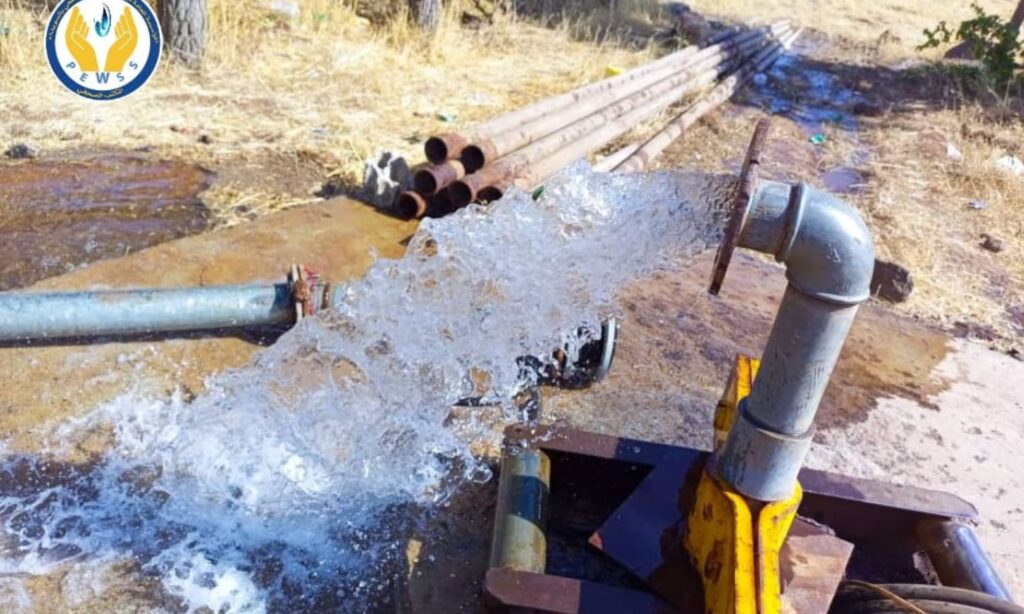The water crisis continues in the As-Suwayda governorate in southern Syria, despite sporadic announcements from regime government officials about projects and maintenance work for wells, dams, and water stations.
The crisis, which has lasted for several years, is attributed to corruption in the management and administration of the As-Suwayda Water Corporation, according to an anonymous employee of the corporation who spoke to Enab Baladi for security reasons.
The source added that a group of individuals within the corporation controls the signing of maintenance contracts and the replacement of parts and well equipment, limiting it to companies importing their equipment from Iran and India, which do not meet the need.
Families are forced to pay between 100,000 and 160,000 Syrian pounds weekly to buy water from mobile tanks, equivalent to between $6.8 to $10.8, as one dollar equals 14,700 Syrian pounds.
The water crisis was also present in As-Suwayda protests, with demonstrators demanding a solution to the water shortage issue and the imposition of popular oversight on its operations.
Protesters addressed demands to the Director of the Water Corporation, including the immediate operation of public wells without delay, ending the activities of public tanks selling water for private profit, and requiring contractors to install pumps of good industrial origin, avoiding reliance on Indian or Iranian pumps.
Increased storage, Ineffective repairs
The official Syrian news agency (SANA) reported at the beginning of July that 19 wells were put back into operation after maintenance and repairs, which was confirmed by the As-Suwayda Water Corporation via Facebook.
On June 27, As-Suwayda’s Director of Water Resources, Badi’ Matar, told the local Al-Watan newspaper that the storage volume within the utilized dams reached 14 million and 214 thousand cubic meters, with drinking water dams storing no more than 5 million cubic meters.
Regarding the Makrama wells, the number of partially utilized wells reached 57 out of 95.
Governmental measures also included addressing water violations in dams by closing openings, as was the case in the Habran Dam. Additionally, they maintained the dam’s sanctuaries (Rum, Habran, Jabal al-Arab) and implemented irrigation projects on wells in Ara and Qarya, according to the Al-Watan newspaper citing Matar.
In February, As-Suwayda dams’ storage volume was 16 million cubic meters, showing an increase compared to the previous year, which did not exceed 10 million cubic meters in February, as Matar told the Tishreen newspaper.
Matar pointed out that the increased water level in the dams would positively reflect on drinking water during the summer, especially with nine dams dedicated to this purpose.
As-Suwayda dams have a maximum storage capacity of 60 million cubic meters, with 17 dams in total.
Government admission of failure
On July 9, As-Suwayda Governor Akram Ali Mohammad and Water Resources Minister of the regime government, Hussein Makhlouf, spoke about the water crisis in the governorate.
The governor stated that “the water file takes most of the time and effort with moment-to-moment follow-ups, standing on all details and working to address them,” but emphasized the need to “double the support to satisfy the residents” and fulfill their water needs.
Minister Makhlouf proposed that the As-Suwayda Water Corporation contract with a private sector company to operate the wells on its responsibility.
Additionally, increasing the number of wells exempted from rationing and the governorate’s electricity allocations at night to operate the wells was suggested.
Makhlouf expressed the ministry’s readiness to provide all forms of financial and administrative support and facilitate procedures for the water file in As-Suwayda.
Bribes and violations
In June, the Director of the As-Suwayda Water Corporation, Wael al-Shariti, acknowledged the phenomenon of “bribes” by water distributors in As-Suwayda neighborhoods.
The biggest problem in As-Suwayda neighborhoods, according to al-Shariti, is the haphazard urban expansion, depriving regulated homes from the required water quantities.
The improper installation of meters to match the number of occupied homes led to water not reaching the required quantities as per the meters, al-Shariti told Al-Watan on June 26.
Additional issues included “some residents’ violations of water pumping orders by installing motors to draw water into their tanks,” and tampering with water lines by breaking or vandalizing water intakes and distribution valves.
Fifteen thousand cubic meters of water are pumped within city neighborhoods daily, which should be sufficient.
Water is distributed within city neighborhoods according to a 15-day schedule, or 10 days if electricity is available.
Emergency declaration
In June 2023, the As-Suwayda Water Corporation declared a state of emergency after almost all dams designated for drinking water were out of operation, relying only on wells, many of which also went out of service.
At the time, Al-Watan newspaper reported that the corporation turned to the local community and donors to try to operate the malfunctioning wells.
The newspaper added that the corporation suffered from a “significant financial deficit,” submerged in debts and financial commitments, with warehouses empty of equipment and unable to procure maintenance parts.

